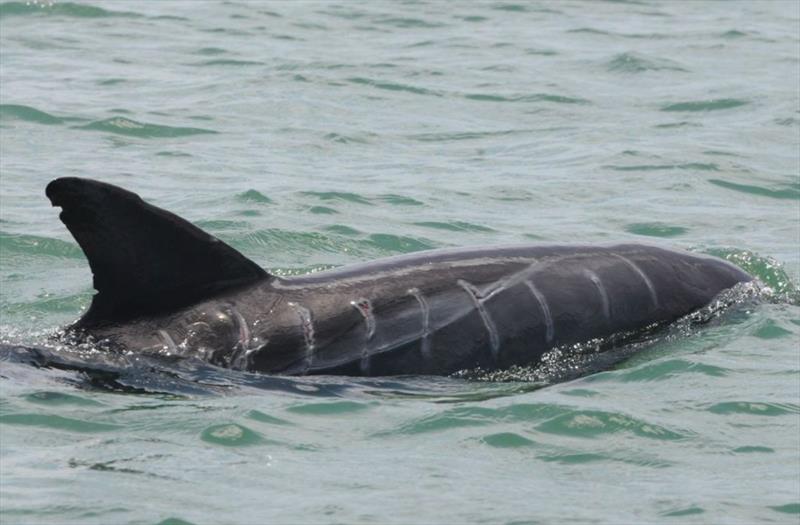
This Memorial Day, go slow for those below!
by Mote Marine Laboratory & Aquarium 25 May 2024 17:49 BST

Dolphin with boat strikes © Alexis Balinski
Memorial Day is just around the corner! As the weather warms up and you head out to enjoy Southwest Florida's coastal waters this boating season, please be mindful of those below! Mote Marine Laboratory & Aquarium recommends that boaters follow Coast Guard-approved safe boating guidelines and use vigilance to avoid striking sea turtles, manatees, and dolphins.
"Florida boasts some of the most beautiful beaches, and we encourage everyone to enjoy them, especially during the summer holidays. However, we must remember that our oceans are home to wonderful marine life," said Dr. Michael P. Crosby, President and CEO of Mote Marine Laboratory & Aquarium. "Following Coast-Guard approved safe boating practices and city or county sea turtle ordinances will help ensure health and safety for all."
Voluntary Sea Turtle Protection Zone
During sea turtle nesting season May 1 - October 31, sea turtles spend more time closer to the surface and close to their nesting beaches. With more turtles near the surface, there's a greater chance that a boat might strike one by mistake. The good news is, boaters can protect sea turtles year-round by slowing down and using vigilance in key locations identified by Mote scientists.
Mote scientists analyzed more than a decade of data showing where boat-struck sea turtles were found stranded in local waters. The most severe stranding hotspots are the focus of a Voluntary Sea Turtle Protection Zone, where boaters are encouraged to go as slow as safely possible, wear polarized sunglasses to better see animals through the water, and designate a wildlife spotter to minimize future boat-strikes.
As part of the study, Hot Spots for boat-struck sea turtles were identified as Longboat Pass, New Pass, Big Pass, Siesta Key, Venice Inlet, and offshore two miles north of New Pass to two miles south of Big Pass extending out one and a half miles.
By going slow in the Zone, boaters can help turn science into protection for marine animals!
"This boating season, enjoy our beautiful coastal waters and help sea turtles by making sure you Go Slow for Those Below!," said Gretchen Lovewell, Mote's Stranding Investigations Research Program Manager.
Watch out sea turtles, dolphins and manatees at sea
While sea turtles are mating offshore and nesting nearshore during sea turtle nesting season, dolphins also give birth in late spring and summer and may not always avoid boats, potentially leading to fatal collisions and injuries in Sarasota Bay.
While manatees mate throughout the year, mating herds are most commonly seen during the summer months. Mating herds consist of multiple male manatees and a single female manatee. In shallower waters, the effect can be quite dramatic with churning waters and flailing flukes and flippers. The activity can attract onlookers who are either curious about the commotion or concerned that the manatees in the herd are injured, stranded, or in distress. In fact, this is natural behavior, and as with all encounters with wild manatees, it is important to observe from at least 100 feet away to avoid disrupting them or risking injury.
Tips for boaters:
- Go slow: Follow Coast Guard-approved safe boating guidelines. Go as slow as safely possible in the Voluntary Sea Turtle Protection Zone—areas bounded by red lines in this map. Follow any posted speed-zone signs—it's required by law.
- Wear polarized sunglasses to see and avoid marine life in your path, and ask one of your passengers to be the designated wildlife spotter.
- Report stranded sea turtles (as well as stranded marine mammals) in Sarasota & Manatee counties to Mote at 888-345-2335. Elsewhere in Florida, contact the Florida Fish and Wildlife Conservation Commission: 888-404-3922.
- Stow trash: Be sure to stow trash and line when under way. Marine debris that accidentally blows overboard or out of a vehicle can become ingested by or entangled around marine life.
- Keep the water trash-free: Never discard trash in the water.
Tips for beachgoers:
All sea turtle species are threatened or endangered, and both state and federal laws strictly prohibit the taking, possession, disturbance, mutilation, destruction, molestation, or harassment of marine turtles, their nests, eggs, or nest marking materials. Violating this law in Florida constitutes a third-degree felony.
The official sea turtle nesting season on the Gulf Coast of Florida runs from May 1 to October 31. Mote scientists monitor sea turtle nesting along 35 miles of beaches from Longboat Key through Venice.
Do:
- If you encounter a nesting turtle or hatchlings, stay behind her, remain quiet and observe from a distance.
- Shield or turn off outdoor lights that are visible on the beach from May through October.
- Close drapes after dark and stack beach furniture at the dune line or, ideally, remove it from the beach.
- Fill in holes that may entrap hatchlings on their way to the water.
Do Not:
- Approach nesting turtles or hatchlings, make noise, or shine lights of any color at turtles.
- Use flashlights or fishing lamps on the beach.
- Encourage a turtle to move while nesting or pick up hatchlings that have emerged and are heading for the water.
- Use fireworks on the beach.
Emergency contacts
To report distressed, injured or deceased sea turtles, manatees, dolphins or whales in the Sarasota/Manatee area call Mote's strandings hotline at 888-345-2335. For locations elsewhere in Florida or to report people tampering with nests or turtles, contact the Florida Fish and Wildlife Conservation Commission Wildlife Alert hotline at 888-404-FWCC (3922), #FWC, *FWC on your cellular phone or use VHF Channel 16 on your marine radio.